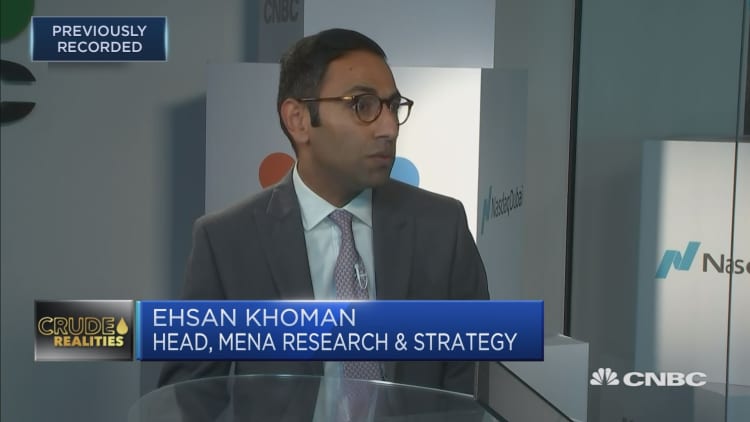Saudi Arabia will likely move to cut its oil output in order to prop up crude prices, against Donald Trump's demands to keep pumping so that prices stay low.
Analysts believe that despite Washington's geopolitical leverage over the kingdom, after its staunch defense of the Saudi monarchy amid accusations over its alleged role in the murder of Saudi journalist Jamal Khashoggi, Riyadh will still pursue its own economic interests rather than abide by the wishes of President Trump.
The pivotal question hanging over oil markets remains that of production cutbacks. Who will tighten their taps, and by how much?
The answers to these questions will be negotiated by the world's largest crude producers — Russia, Saudi Arabia and the U.S. — at this week's G-20 meeting in Buenos Aires, Argentina, and then at the OPEC+ meeting in Vienna, Austria, the following week.
The spectrum is huge, ranging from a potential 500,000 to as many as 2 million barrels per day (bpd) taken off the market, according to Ehsan Khoman, head of MENA research and strategy at the Dubai branch of Japanese bank MUFG.
"Saudi Arabia will likely see through the pressure and not entertain calls from President Trump, and in fact lower production," he said. "The key question now is the size and magnitude of the actual production cuts for each of the OPEC members."
In November 2016, when OPEC and non-OPEC members initially implemented production cuts to stem falling prices and end the supply glut, roughly 1.8 million barrels came off the market.
"This time around, given the large oversupply we have in the market, we think anything between 1.3 and 1.5 million barrels could come off the market when they meet in Vienna," Khoman told CNBC's "Capital Connection" on Wednesday.
Managing oversupply
Brent crude has been struggling to get back above $60 a barrel after a dramatic week, trading at $58.76 at Wednesday's close.
Oil suffered a more than 20 percent drop for the month last Friday as the global benchmark hit a year low of $58.41 on fears of global oversupply. The price of oil swung from a 52-week high to a 52-week low in just 27 days.

After a surge to more than $86 per barrel in early October ahead of U.S. sanctions on Iran, OPEC's third-largest producer, prices plummeted on news that Washington would issue 180-day waivers to a raft of oil-importing countries comprising roughly 75 percent of world oil demand.
The Saudis, who Trump had convinced to pump more oil to make up for the market's loss of Iranian crude, found themselves caught off guard. The kingdom had raised production to an all-time high in November, pumping 11.1 million to 11.3 million bpd.
Now it's in Riyadh's interest to put a floor beneath oil prices and bring them back up to their "fiscal breakeven level" — the level at which the country's budget can be balanced. MUFG calculates this to be $75 per barrel.
'Geopolitical leverage'
But the kingdom is wary of upsetting Trump, who has long been vocal — especially via Twitter — about what he sees as the Saudis' obligation to help keep prices low.
Trump's official statement on the murder of Jamal Khashoggi, which boldly exonerated Saudi Arabia and its powerful Crown Prince Mohammed bin Salman of any responsibility, made a point of highlighting Riyadh's importance to stabilizing oil markets. The Saudis "have worked closely with us and have been very responsive to my requests to keeping oil prices at reasonable levels — so important for the world," the statement read.
WATCH: Who is MBS?

Meanwhile, a growing number of senators have called for sanctions on U.S. weapons sales to the kingdom and a halt in support for its war in Yemen, where tens of thousands have been killed and several million are facing starvation.
But despite its sensitive position, under intense international scrutiny with a now increased reliance on political support from the Trump administration, the Saudis are expected to go ahead with cuts, according to a range of market experts. Of course, the key question remains by how much.
'1 million bpd or more' off the market?
Societe Generale, similarly to MUFG, forecasts at least 1 million barrels taken off the market after December's OPEC meeting.
"Given recent dramatic increases in crude output from OPEC, Russia and the U.S., along with higher projected flows from Iran than previously expected, we anticipate that Saudi Arabia and OPEC+ will cut crude supply by 1 million bpd or more," the bank said in a note published Tuesday. "This will be necessary to avoid severe oversupply in 2019 and to maintain Brent prices within the desired range of $70-80."
Goldman Sachs and Credit Suisse, in separate reports, issued similar assessments that predict a Saudi cut, in coordination with other OPEC and non-OPEC members.

MUFG views Brent and U.S. West Texas Intermediate to be "oversold," predicting a "sharp rebound" in coming months, while Societe Generale forecasts Brent at $73 for both 2018 and 2019.
Richard Robinson, manager of Ashburton Global Energy Fund, sees the current bear market mode as merely fleeting. "We believe the current dip is transient and the oil price will recover over the next three months to levels of between US$70-80," he wrote in a client note Wednesday.
But there are still those in the markets with a more bearish outlook. Capital Economics, a London-based economic research consultancy, forecasts oil prices stabilizing at $55 to $60 per barrel in the "next couple years," as does Frank Gunter, professor of economics at Lehigh University in Pennsylvania.
"The magnitude of the cut will determine where oil prices go," Khoman said. "If the cut between 1.4 million and 1.5 million bpd occurs, we will see a sharp rebound in prices — anything between $5 to $7 or $8 going before Christmas."


